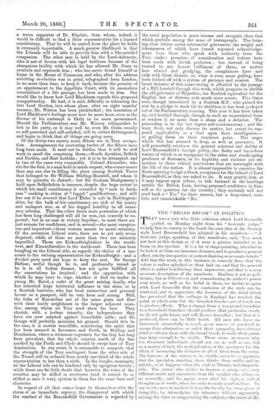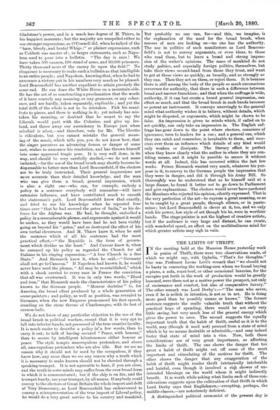THE "BROAD BRUSH" IN POLITICS.
THAT was a very wise little criticism which Lord Granville quoted on Monday night from his "first-rate judge," to help him to convey to the Lords his own idea of the literary style Lord Beaconsfield has adopted in his manifesto :—" A first-rate judge, speaking of this manifesto, said, You must not look at this design as if it were a picture intended to be hung on the eye-liue. It is a bit of stage-painting, intended to be looked at from an immense distance, and to produce a general effect, utterly irrespective of correct drawing or accurate details." Add that the work, in this instance, is coarsely done, that the colour is rather splashed on than laid on, and that the general effect is rather bewildering than impressive, and that is a very accurate description of the manifesto. Reading it not as poli- ticians, but as littgrateurs, and remembering its author's power over words, as well as his belief in them, we incline to agree with Lord Granville that the confusion of the style was in- tentional, and to appreciate the keenness of the mind which has perceived that the suffrage in England has reached the point at which none but the broadest brushes are of much use to produce effects. Why a change from a ten-pound franchise to a household franchise should produce that particular result, we do not quite know, and will discuss hereafter ; but that it is produced, there can be little doubt. All men who have en- deavoured successfully to touch great masses of mankind, to secure their admiration or enlist their sympathy, have always tried to attract them with the broad brush, to make their paint- ings large enough to be visible. There seems no reason why ten thousand individuals should not see as well as one, but as a matter of fact, the multiplication of the spectators has the effect of increasing the distance of all of them from the scene. The features of the statue, to be visible, must be so gigantic, that the spectator, standing close, thinks them unlike and in- artistic, or as happens when the scale is Titanic, indistinguish- able. The orator who wishes to impress a group, use very different words and arguments from the speaker who addres,.es an assembly ; and he, again, must alter his style, as well of thoughts as of words, when he seeks to make a nation hear. To one or two men in modern history the faculty has been given of doing this, by intensifying the utterance without apparently raising the voice or exaggerating the subject,—the secret of Mr. Gladstone's power, and in a much less degree of M. Thiers, in his happiest moments ; but the majority are oompelled either to use stronger expressions, as O'Connell did, when he talked of the ! "base, bloody, and brutal Whigs ;" or plainer expressions, such as Cobbett was master of ; or larger statements, such as Napo- leon used to pour into a bulletin. "The day is ours ! We have taken 500 cannon, 100 stand of arms, and 80,000 prisoners. Thirty thousand more of the enemy lie upon the field !" No eloquence is necessary to make such a bulletin as that intelligible to an entire people; and Napoleon, knowing that, when he had to announce a victory put in his numbers very much as he pleased. Lord Beaconsfield has another expedient to attain precisely the same end. He can draw the White Horse on a mountain-side. He has the art of so constructing a proclamation that the words of it have scarcely any meaning, or any grammar, or any coher- ence, and are hardly, taken separately, explicable ; and yet the total drift of the whole is not to be mistaken. Pick his mani- festo to pieces, and there is nothing in it; yet nobody has mis- taken his meaning, or doubted that he meant to say the Liberals would part with the Colonies, and give up Ire- land, and throw away our ascendency in Europe just when mischief is afoot,—and therefore, vote for Me. The libretto is ridiculous, but you cannot mistake the general mean- ing of the music, which tells you, you do not know how, that the singer perceives an advancing demon or danger of some sort, wishes to announce his resolution, and has thrown himself into some approved tragic pose. It is very well done, in its wag, and should be very carefully studied,—we do not mean imitated,—for the use of the broad brush may shortly become in- dispensable to better men than Lord. Beaconsfield, if the electors are to be truly instructed. Their general impressions are more accurate than their detailed knowledge, and the man who can give them a broad, general impression, which is also a right one—who can, for example, embody a policy in a sentence everybody will remember—will have extensive influence, and have contributed much to smooth the statesman's path. Lord Beaconsfield knew that exactly, and tried to use his knowledge when he repeated four times over "that he had secured the gates of India," as his de- fence for the Afghan war. He had, he thought, embodied a policy in arememberable phrase, and arguments against it would be useless, as they would have been had he not been visibly going on beyond his "gates," and so destroyed the effect of his own verbal cleverness. And M. Thiers knew it, when he said the sentence which of all his sentences had the most practical effect,—" the Republic is the form of govern- ment which divides us the least." And Cavour knew it, when he summed up his policy as regarded the Church for all Italians in his ringing expression,—" A free Church in a free State." And Bismarck knew it, when he said,—" Germany shall not go to Canossa." If Napoleon had known it, he would never have used the phrase, "All may be re-established," which with a shock carried to every man in France the conviction that all was overturned. It was in only two words, "Blood and iron," that Bismarck made the characteristics of his policy known to the German people. "Monroe doctrine" is, for America, the broad effect produced by a whole generation of scene-painters ; and policy, as well as position, was revealed to Germans, when the new Emperor pronounced his first speech, standing on the stone throne of Charlemagne, with its feet of cannon-balls.
We do not know of any particular objection to the use of the broad brush in political warfare, except that it is very apt to fall into inferior hands, not possessed of the true creative faculty. It is much easier to describe a policy in' a few words, than to carry it out; to talk of having secured "Peace, with honour," than to secure by intelligent laboriousness either honour or peace. The style tempts unscrupulous pretenders, and above all, unscrupulous pretenders who are also idle. But we see no reason why it should not be used by the scrupulous, if they know how, any more than we see any reason why a truth which it is necessary to make known should not be shouted through a speaking-trumpet. It is not agreeable to hear, if you are close, and the truth in some minds may suffer from the over-broad form in which it is communicated; but if the ship is on fire, and the trumpet handy, use your trumpet, by all means. If anybody could convey to the electors of Great Britain the whole import and drift of Tory Democracy, as Lord Beaconsfield has endeavoured to convey a misrepresentation of the true import of Liberal policy, he would do a very great service to his country and mankind.
But probably no one can, for—and this, we imagine, is the explanation of the need for the broad brush, when masses of men are looking on—no one has the authority. The use in politics of such manifestoes as Lord Beacons- field's is not to convey arguments, or even ideas, to those who read them, but to leave a broad and strong impres- sion of the writer's opinions. The mass of mankind do not study politics, and especially foreign politics, themselves, but take their views second-hand from those they trust, and want to get at those views as quickly, as broadly, and as strongly as they can. Then they act on them, or reject them. It is because there is still among the body of the people so much unconscious reverence for authority, that there is such a difference between broad and narrow franchises; and that when the suffrage is -wide, authority, if it can but areabe a broad general impression, can effect so much, and that the broad brush in such hands becomes so potent an instrument. It conveys unerringly to the general mind what authority wishes it to believe, without details, which might be disputed, or arguments, which might be shown to be false. Au impression is given to minds which, if called on to act quickly, can only take an impression in. The English snf- fra.ge has gone down to the point where electors, conscious of ignorance, turn to leaders for a cue; and a general cue, which they can catch and remember, is invaluable to them, and exer- cises over them an influence which details of any kind would only weaken or dissipate. The literary effect is perfect when they know clearly what the author in whom they are con- fiding means, and it might be possible to secure it without words at all. Indeed, this has occurred within the last few weeks. Prince Bismarck wanted very much, whatever his pur- pose in it, to convey to the German people the impression that they were in danger, and did it through his Army Bill. So thoroughly was he understood that as he himself said at a large dinner, he found it better not to go down to Parliament and give explanations. The electors would never have pardoned the Members who rejected his opinion, silently expressed. That is the very perfection of the art—to express a great meaning, so as to be caught by a great people, through silence, or in panto- mime; but Lord Beaconsfield is clever at it, too, and we only wish his power, low style of art though his be, were in worthier hands. The stage-painter is not the highest of creative artists, but if the audience is very large and distant, he can create, with wonderful speed, an effect on the multitudinous mind for which greater artists may sigh in vain.



































 Previous page
Previous page